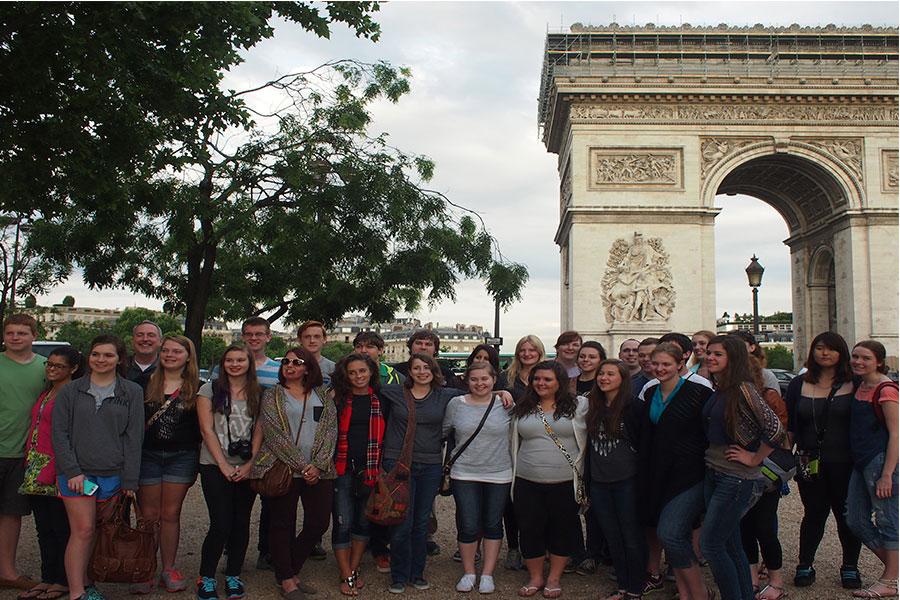Travel for a Reason
Published: April 13, 2016
Our planet has 196 countries, has 7,000 languages and holds 7.4 billion people. For some, the land and people outside of their continent, country or even county may seem distant and unreachable. However, many others embrace adventure and choose to travel around the country and around the globe.
“I think travel is a life-changing experience and I think it’s important to provide that opportunity,” German teacher Anne McPartland said. “It’s cool now that we have technology
so you can Skype or Snapchat with people from around the world, but I think being there yourself really changes your perspective. You learn a lot about yourself. You learn how you deal with stress and how you deal when you’re in a place where everyone
speaks a language you don’t know. You can’t read that in a book or watch it in a movie. You really just have to live it.”
Traveling can have many benefits because it exposes travelers to foreign languages and other aspects of culture. Visiting other places also gives one the opportunity to try exotic foods, hear different music and meet new people. Many of these events simply cannot be taught in a classroom or be experienced authentically at home.
“Traveling is different from what you learn in class,” freshman Sydney Wise said. “In class they teach you about the more proper parts of a country, but then when you actually go to the country it’s a different experience.”
According to French teacher Dave Fritz, travelling as a teenager can be more special than travelling as an adult because many teenagers simply don’t have the opportunity to leave the country. Also, most teenagers travel with their families, so they are usually less concerned with the cost and the planning that goes into vacation. Jo Ellen Kerksiek, Director of Study Abroad at Lindenwood University, adds that most young people have more stamina and time than adults have.
“It’s a lot easier to do it when you’re in college,” Kerksiek said. “I think getting that exposure to another culture, whether you’re talking about foods, customs or really just the way different places look, is a lot easier to
do when you can take a semester or even a month over the summer. Once you graduate from college, you start working full time and life really tends to get in your way, and it’s really, really hard to set aside a block of time to travel.”
Even attitudes toward travel are different in other regions. In the European Union, employers are required to give their workers at least four paid weeks of vacation, according to USA Today. The United States is the only developed country that doesn’t require employers to give workers paid vacation.
“[Europeans] do a lot more traveling because they have the time to,” McPartland said. “It’s more of a priority.”
Distance is another factor in travel. Most other countries are closer to one another, so it takes less time and money to travel internationally. For example, flights from St. Louis to London average 10 to 12 hours. Flights from Paris to London are only slightly over an hour.
“One thing for us is that [other countries are] so far away a lot of the time,” McPartland said. “In Europe when they travel they’ll go to Australia or Egypt or the Canary Islands. That’s different and seems more exotic to us.”
Traveling within the United States has its benefits, too. Everything from the food to the entertainment can differ between regions. Many areas have unique sayings, mannerisms and dialects along with different traditions and landscapes. For example, the Dictionary of American Regional English found that there are 15 different ways throughout the United States to say the word “dragonfly.”
“Since not everybody throughout the United States speaks like, behaves like and eats like people in the Midwest, it’s always a good thing to learn how the other half lives,” Fritz said. “Go out west, go down south, go up north and see what people are like there.”
St. Louis has traditionally been a melting pot of cultures, first as German, Italian and Irish immigrants settled here. Today, most immigrants to St. Louis come from Southeast Asia, Latin America, Haiti and the Caribbean, according to the St. Louis Cultural Office. From the Art Museum to the Hill, the people of St. Louis can experience different cultures without even leaving the city.
People can also explore different countries without leaving their homes. There are countless books, movies and websites about other nations. While not as beneficial as travelling, they can still help expose people to different parts of the world.
“That’s not something I would recommend or advise anyone to do,” Fritz said. “Get out and learn about it first hand, but there are some great novels you can read and there are documentaries.”
Both McPartland and Fritz agree that one of the most beneficial ways to prepare for international travel is to learn a bit of the other country’s language. Learning foreign languages often increases understanding and appreciation for other societies and helps people navigate the increasingly globalized world. Beyond that, they recommend traveling with an open mind.
“Things don’t always go the way you want them to, but experiencing different places is always worth the effort and frustration that sometimes comes with travel,” Fritz said.





![FHN Holds Prom at Old Hickory Country Club [Photo Gallery]](https://FHNtoday.com/wp-content/uploads/2024/04/Brewer_stopmotion-9-300x200.jpg)

![FHN Students Watch the Solar Eclipse [Photo Gallery]](https://FHNtoday.com/wp-content/uploads/2024/04/4.8.24-solar-eclipse_-300x200.jpg)
![FHN Boys Varsity Volleyball Team Goes Against Troy [Photo Gallery]](https://FHNtoday.com/wp-content/uploads/2024/03/IMG_7545-300x200.jpg)
